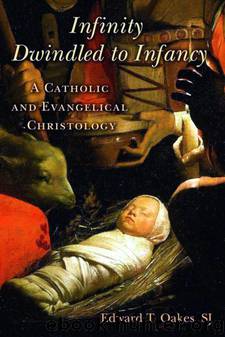Infinity Dwindled to Infancy: A Catholic and Evangelical Christology by Edward T. Oakes S.J

Author:Edward T. Oakes S.J.
Language: eng
Format: mobi
Published: 2011-08-16T20:59:00+00:00
Kenotic Christology: Thomasius, Gess, Mackintosh
The names of Gottfried Thomasius (1802-75), Wolfgang Friedrich Gess (181991), and Hugh Ross Mackintosh (1870-1936) are not exactly household names, even among professional theologians. Their neglected status testifies not just to the esoteric nature of the questions they set for themselves but also to the fact that the answers they developed eventually came to be rejected by a wide spectrum of theologians. To be sure, that rejection had different, even opposite reasons: some rejected these three for their alleged unorthodoxy, while others scored them for their alleged pusillanimity before the challenge of historical criticism. Their inclusion in this work might therefore seem eccentric, except for two facts: their failure is itself instructive, and later theologians would claim to have learned from their mistakes and would then seek to revive a more orthodox version of kenotic Christology.
For that is the name of their school of Christological thought: kenotic. At first glance, it might seem surprising that any such school would run into trouble, grounded as it is in Paul's line that Christ "emptied" (ekenosen) himself to take on the form of a slave (Phil. 2:7). For as Thomas Thompson points out:
Every Christology of Incarnational tack celebrates a kenotic motif. Only the most docetic of Christological models depreciate the deigning grace of God the Son, who though rich became poor for our sakes. Such impugn the gospel witness: that the wisdom of God is uniquely cruciform, and therefore humble and meek - a refinement in the doctrine of God that many Greeks found unpalatably foolish. At the heart of its confession, the catholic church has long affirmed the humbling, self-accommodating, lisping humanity of God. In this broad thematic sense a "kenotic Christology" is rather a tautology, much like a "theology of
The situation is made even odder by the professed claims of the kenotic theologians that they were being faithful to the central pillars of Chalcedonian dogma: the true deity, the true humanity, and the true unity of these two in the single personhood of Christ. As Thomasius said in his most influ ential work, Christi Person and Werk, his dogmatic textbook using Christology as its organizing central focus: "Accordingly, for the treatment of Christology, we can set down the canon that every conception of the person of the mediator that endangers either the reality of his deity, or the truth of his humanity, or the unity of his person is an erroneous one."44
Download
This site does not store any files on its server. We only index and link to content provided by other sites. Please contact the content providers to delete copyright contents if any and email us, we'll remove relevant links or contents immediately.
Resisting Happiness by Matthew Kelly(3337)
The Social Psychology of Inequality by Unknown(3018)
Day by Elie Wiesel(2780)
Designing Your Life by Bill Burnett(2740)
The Giving Tree by Shel Silverstein(2336)
Human Design by Chetan Parkyn(2068)
The Supreme Gift by Paulo Coelho(1962)
Angels of God: The Bible, the Church and the Heavenly Hosts by Mike Aquilina(1954)
Jesus of Nazareth by Joseph Ratzinger(1811)
Hostage to the Devil by Malachi Martin(1800)
Augustine: Conversions to Confessions by Robin Lane Fox(1769)
7 Secrets of Divine Mercy by Vinny Flynn(1739)
Dark Mysteries of the Vatican by H. Paul Jeffers(1706)
The Vatican Pimpernel by Brian Fleming(1699)
St. Thomas Aquinas by G. K. Chesterton(1632)
Saints & Angels by Doreen Virtue(1603)
The Ratline by Philippe Sands(1571)
My Daily Catholic Bible, NABRE by Thigpen Edited by Dr. Paul(1496)
Called to Life by Jacques Philippe(1475)
